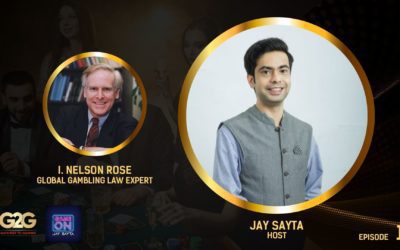Gambling and the Law®:
What Should Daily Fantasy Sports Do Now?
The two big Daily Fantasy Sports (“DFS”) operators, FanDuel and DraftKings, and their backers, are, in the immortal words of former President George H.W. Bush, in “deep-doodoo.” But lawyers with legal shovels can probably dig them out.
As recently as last year, the DFS industry’s problems were relatively insignificant. As in the early days of Internet poker, operators were making so much money that they could afford to brush off the few scattered questions about the games’ legality.
The explosion of interest in DFS, fed in part by unprecedented massive television advertising campaigns, was bound to raise challenges. DraftKings and FanDuel are more than just important advertisers for ESPN. “In fact, some 59% of the media advertising revenue growth in the last quarter ($134 million) came from the fantasy sites.”[1] But a scandal at the end of September 2015 brought operators attention they did not want, including threats from government officials that the DFS operators would be arrested unless they stopped taking players from Nevada and New York.
The scandal could have been easily avoided. A manager of DraftKings accidentally released confidential information about which real-world athletes DFS players were selecting, and then, perhaps coincidentally, the same manager won $350,000 playing fantasy football at rival FanDuel. This, of course, looked like the DraftKings employee used inside information to give himself an advantage in choosing which players to put on his FanDuel fantasy team.
Online fantasy sports, like all new games, were created and staffed by people who like to play those same games. Anyone with experience with legal gaming, especially Internet gambling, and most especially a lawyer, would have warned the operators to bar their employees from participating in high-stakes DFS games.
It appears that both FanDuel and DraftKings did prohibit their staff members from participating in their own real-money games. But since there are only two large operators, employees of each company should not have been allowed to play on the other company’s site. At the very least, individuals with inside information should have had contracts warning them that they would have been fired if they were found to have participated in any high-stakes real-money DFS game.
I would have also recommended inclusion of a liquidated damages clause, requiring any employee who won more than, say, $1,000 playing DFS in violation of his employment contract to forfeit all the money he won to his employer. Liquidated damages are included in contracts when the parties know it would be difficult to measure or prove the actual damages that would be caused by a breach. Given the potential harm to the operators’ reputations by an insider winning a large amount, it is probable that the liquidated damages clause would have been upheld. It would have at least warned employees that playing DFS for big money was not worth the risk.
The dangers were not limited to DFS operators. Investors, media companies and real-world sports teams can also be dragged into the legal morass.
The worst possible direct penalties come from the criminal laws, especially the state and federal statutes passed to fight organized crime. If DFS is indeed illegal, then companies like ESPN could be criminally liable merely for running the operators’ commercials.
Helping someone else to commit a crime, usually called aiding and abetting, makes the accomplice guilty of that crime. So, if DFS operators are violating the federal Wire Act,[2] which makes it a crime to send information useful in the placing of bets on sports events across state lines, then companies running DFS ads would also be guilty of that crime.
Making an agreement and running advertisements for an illegal activity would constitute the separate crime of conspiracy. And if the crime is illegal gambling, there are special statutes, like the federal Illegal Gambling Businesses Act, that make it a felony, if certain other requirements are met, to participate in the business.[3]
It is unlikely that federal prosecutors will go after media companies, due to First Amendment concerns. Investors and profession sports teams have less protection, but also would not be attractive targets, at least for U.S. attorneys. State attorneys general and district attorneys are slightly more likely to like the publicity that indicting a big money investor or well-known team might bring; but only if the prosecutors thought they would win.
A greater concern for DFS partners are the inevitable civil suits. Class actions have already been filed. One of the most extensive was filed in Florida in late November by two DFS patrons. The suit named approximately 50 individuals and organizations as defendants. These include four pro sports leagues, the MBA, MLB, NHL, MLS; large media companies, including NBC Sports Comcast and Fox Sports Interactive Media; Visa, MasterCard and American Express; J.P. Morgan and other big banks; and, PayPal and other payment processors.[4] Conspicuous by its absence is the National Football League. The NFL has never openly endorsed DFS. But three owners of professional sports teams, including the owner of the New England Patriots, who invested in DFS operators, are named as defendants.
It is probably not surprising that so many large and wealthy institutions did not do more to protect themselves. Gaming, including both gambling and non-money games, are not treated seriously by most people. Although companies will have their lawyers look over the contracts, they, and their lawyers, will enter into multi-million-dollar deals without having even asking whether the underlying business is legal. It is not even clear whether the media, credit card companies and other partners put in protections, such as requiring the DFS operators to indemnify them against legal actions.
This does not mean that the DFS operators and their partners are going to lose their legal fights. In fact, the actual legal situation is not nearly as bad as a quick reading of headlines would indicate.
Take, for example, the two most important state actions that have been thrown up against DFS operators. In Nevada, the Chair of the Nevada Gaming Control Board issued a letter stating that DFS is gambling and thus cannot operate without a state gaming license. In New York, the Attorney General has also declared DFS illegal and has sent a cease and desist letter, which has now been followed by civil suits.
Nevada is the most important state for legal gambling. But in terms of paying patrons, it simply is not a very big market for DFS. Even before the current controversy, casino companies like MGM looked at DFS and concluded that it just wasn’t worth their getting into the game.
More importantly, it is far from clear that DFS is gambling under Nevada state law. On October 15, 2015, A.G. Burnett, Chairman of the Nevada Gaming Control Board, issued a formal Notice to “All Licensees and Interested Parties,” on the “Legality of Offering Daily Fantasy Sports in Nevada.”[5] Chairman Burnett asked the Board’s staff and the Nevada Attorney General’s Gaming Division to evaluate DFS. Burnett’s Notice reads:
Based on these analyses, I, along with Board staff, have concluded that DFS constitutes gambling under Nevada law. More specifically, DFS meets the definition of a game or gambling game pursuant to Chapter 463 of the Nevada Revised Statutes. Moreover, because DFS involves wagering on the collective performance of individuals participating in sporting events, under current law, regulation and approvals, in order to lawfully expose DFS for play within the State of Nevada, a person must possess a license to operate a sports pool issued by the Nevada Gaming Commission. Further, a licensed operator who offers DFS must comply with all laws and regulations that apply to licensed sports pools.
State-licensed sports books are allowed to take bets on sports events and run sports pools. But the Notice makes it clear that the DFS would have to be run by those state-licensed bookies, and that they would have to be careful about associating with outside companies that might be violating other states’ anti-gambling laws.
The Notice raises interesting procedural issues. Nevada regulators have no direct power over DFS operators like FanDuel and DraftKing that are not licensed by the state. Gambling regulators can declare non-licensed individuals and companies as being unsuitable. And they can decide what is allowed in state licensed gaming facilities. But it is doubtful whether Nevada gaming regulators have the power to declare activities as being gambling if they are not conducted on the grounds of a casino or similar facility. Even the power to declare a company as being unsuitable is not of much legal value if that company is not associated in any way with a Nevada licensee.
Putting it more bluntly, it is not up to the Chairman of the Nevada Gaming Control Board to decide whether an activity like DFS is or is not gambling, if that activity has nothing to do with any of the state’s licensees. Regulators of legal gambling are not public prosecutors.[6] The interpretation and enforcement of the state’s anti-gambling laws for activities conducted over the Internet directly into people’s homes is a matter reserved for law enforcement, the state’s district attorneys and Attorney General, not gaming regulators.
There are also due process concerns. Chairman Burnett has declared DFS operators as violating Nevada’s anti-gambling laws. But the DFS operators were not given their day in court. In fact, they were not even given the chance to have a hearing on the facts and laws. And, because they are not subject to licensing, they do not have an opportunity to contest the Chairman’s conclusion through the normal regulatory process. A criminal prosecution allows a defendant to challenge the charges. In this case, the only way DFS operators can challenge this Notice is to file suit for a declaratory judgment and perhaps an injunction to get their day in court.
And the DFS operators might win. If DFS is predominantly a game of skill, it would not be gambling or a sports pool under Nevada law.
It is up to each state to decide whether an activity has enough skill to be considered as a contest of skill rather than gambling. Courts have laid down many different tests for determining whether a game is predominantly a game of skill. In brief, they will look for the following:
1) A skillful player will win more than an unskillful one.[7]
2) Skill can be learned from experience, from real or mock play.
3) Skill games require a knowledge of mathematics.
4) Skill games require psychological skill.
5) Player participation changes the result.
6) Skill can be learned from reading.[8]
7) The opinion of the community.
In Las Vegas Hacienda v. Gibson theNevada Supreme Court declared, in dicta, that it is up to the trial court to decide whether an activity is predominantly skill or chance. The facts of the case offers strong support for DFS operators, because it involved a reward of $5,000 for a 50 cent entry fee for a hole-in-one on a golf course. The trial court found that the shooting of a hole-in-one was a feat of skill. Even though it was not necessary for its decision, the Nevada Supreme Court went out of its way to declare:
The test of the character of a game is not whether it contains an element of chance or an element of skill, but which is the dominating element.People ex rel. Ellison v. Lavin, 179 N.Y. 164, 71 N.E. 753, 66 L.R.A. 601. It was within the province of the trial court to determine this question. Brown v. Board of Police Commissioners, 58 Cal. App. 2d 473, 136 P.2d 617.[9]
If a hole-in-one is predominantly skill, then surely DFS is also not gambling.
DFS operators face a different situation in New York. As the third most populous state, New York cannot be ignored. Plus, attorneys general talk to each other informally all the time. The official declaration[10] that DFS is gambling would quickly spread to other states.
The DFS operators had no choice but to file suit. If they had continued to take real-money players from New York without court permission they risked being arrested. FanDuel’s headquarters is in New York City. But even DraftKing, with corporate offices in Boston, would easily be extradited.
Being charged with a crime is always bad. But there are several legal considerations that would make the situation even worse for these DFS operators. Under both state and federal case law, once a state criminal action has been filed, the defendant cannot then ask a civil court to hear the case. State civil courts simply will not hear any claim that the criminal statute is unconstitutional or that the prosecutors are misinterpreting state law: These and any similar complaint can be raised as a defense in the pending criminal action. Federal courts do have the power to intervene, but the U.S. Supreme Court has told lower federal courts to abstain; that it would undermine “Our Federalism” to prevent a state criminal trial from going forward, even if federal constitutional issues are at stake.[11]
So, the DFS operators had to file for a temporary restraining order to prevent being arrested while they prepared for a preliminary injunction hearing with expert testimony. In an interesting development, New York Attorney General Eric T. Schneiderman agreed to let them keep taking players from his state, at least until the court could conduct a more thorough hearing. He also filed his own complaints to shut them down, using the civil rather than criminal justice system.
The last is most significant: It means that the courts should allow the DFS operators to keep taking New York patrons until a full trial can be held.
A preliminary injunction is an extraordinary remedy. Courts are required to balance the hardships of the plaintiff and defendant and also take into account the public interest. In this case, if the A.G. wins, two thriving businesses would be shut down, throwing dozens if not hundreds of people out of work, even if the DFS operators eventually won at trial.
And what would be the hardship to the state of New York if the DFS operators were allowed to continue? DraftKings was founded in January 2011; FanDuel is even older, started in 2009. Attorney General Schneiderman is going to have a tough time convincing a judge that the state will suffer some irreparable harm if the companies were allowed to continue in business until a full trial can be held. What’s the emergency? If daily fantasy sports is such a clear and present danger why did the state let it continue unmolested for half a decade? If DraftKings and FanDuel were a public nuisance they could have been closed down with injunctions years ago. And if they were so clearly breaking the law, they could have been arrested.
It is always dangerous to make predictions in writing. By the time you read this, the first hearing in New York will have already occurred. But I will go on record as predicting that the court will not close down either DraftKings or FanDuel with a preliminary injunction.
It is much more difficult to predict which side will win a full trial for a permanent injunction. But I have another prediction: If the DFS operators are allowed to stay open in 2015 that trial will never take place. DraftKings, FanDuel and their rich and powerful media allies will use their enormous political influence to get the New York Legislature to pass a law making most of their operations legal.
They may have to give up daily games and be limited to real athletic events that take place on at least two days. And they will certainly be required to be regulated.
But there is too much money at stake to see daily fantasy sports disappear any time soon.
END
© Copyright 2015. Professor I Nelson Rose is recognized as one of the world’s leading authorities on gambling law and is a consultant and expert witness for governments and industry. His latest books, Gaming Law in a Nutshell, Internet Gaming Law and Gaming Law: Cases and Materials, are available through his website, www.GamblingAndTheLaw.com.
[1] Michael Hiltzik, “Daily Fantasy Sports’ High Stakes,” Los Angeles Times § C p. 1 (Nov. 22, 2015).
[2] 18 U.S.C. § 1084.
[3] The Illegal Gambling Businesses Act, 18 U.S.C. § 1955, makes it a federal felony to be part of a business that violates a state anti-gambling law and has five or more people and does at least $2,000 in business a day.
[4] Mike Chiari, “Daily Fantasy Sports Customers File Class-Action Lawsuit in Florida,” Bleacher Buzz, https://bleacherreport.com/articles/2584449-daily-fantasy-sports-customers-file-class-action-lawsuit-in-florida (Nov. 21, 2015).
[5] Notice # 2015-99, https://gaming.nv.gov/modules/showdocument.aspx?documentid=10481.
[6] The Bureau of the State Lottery in Michigan is a rare exception, with the power to prosecute illegal gambling that has nothing to do with the State Lottery.
[7] State v. Randall, 256 P. 393, 394 (Or. 1927).
[8] In re Allen, 27 Cal.Rptr. 168, 53 Cal.2d 5, 377 P.2d 280 (1962).
[9] Las Vegas Hacienda v. Gibson, 359 P.2d 85 (1961).
[10] A.G. Schneiderman Issues Cease-And-Desist Letters to FanDuel And DraftKings, Demanding That Companies Stop Accepting Illegal Wagers in New York State, https://www.ag.ny.gov/press-release/ag-schneiderman-issues-cease-and-desist-letters-fanduel-and-draftkings-demanding (Nov. 11, 2015).
[11] Younger v. Harris, 401 U.S. 37 (1971).





0 Comments